
Transnational Screens
Scope & Guideline
Unveiling the Complexities of Globalized Artistic Expressions
Introduction
Aims and Scopes
- Transnational Film Studies:
The journal explores how films transcend national boundaries, examining co-productions, cultural exchanges, and the impact of global cinema on local identities. - Cultural Representation and Identity:
A consistent focus on how films represent diverse identities and cultures, including analyses of gender, race, and ethnicity in transnational contexts. - Audience Reception and Engagement:
Research on how audiences engage with transnational films, including the influence of streaming platforms and global distribution on viewing habits. - Historical and Contemporary Perspectives:
The journal covers both historical and contemporary cinema, addressing how past film practices inform current transnational trends. - Interdisciplinary Approaches:
Utilizing methodologies from various fields such as cultural studies, media studies, and sociology, the journal emphasizes interdisciplinary perspectives in film analysis.
Trending and Emerging
- Sino-International Collaborations:
Recent publications highlight the growing significance of Sino-international film co-productions, reflecting broader geopolitical dynamics and cultural diplomacy. - Queer Cinema and Representation:
There is an emerging focus on queer cinema within transnational contexts, exploring how LGBTQ+ narratives are represented and received across different cultures. - Digital and Streaming Media:
The impact of digital platforms on transnational cinema is increasingly emphasized, with research on how streaming services reshape audience engagement and film production. - Transnational Feminisms:
A notable trend is the exploration of transnational feminist approaches in cinema, addressing issues of gender, power, and representation in global contexts. - Cinematic Responses to Global Crises:
Emerging themes include how cinema responds to global crises, such as migration, cultural memory, and political upheaval, showcasing the role of film in contemporary societal discussions.
Declining or Waning
- Traditional National Cinema:
There seems to be a waning interest in traditional forms of national cinema, as the focus shifts towards more fluid and hybrid forms of transnational storytelling. - Static Cultural Narratives:
Papers that center on fixed cultural narratives without considering their transnational implications are less prevalent, indicating a shift towards more dynamic analyses of cultural intersections. - Historical Film Analysis:
There is a noticeable decline in articles strictly analyzing historical films in isolation, with a preference for examining their transnational relevance and connections.
Similar Journals
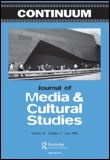
Continuum-Journal of Media & Cultural Studies
Pioneering discussions in the evolving world of media.Continuum-Journal of Media & Cultural Studies, published by Routledge Journals, Taylor & Francis Ltd, stands as a premier platform for scholarly discourse in the fields of media studies, cultural studies, visual arts, and performing arts. With an impressive Q1 ranking in both Cultural Studies and Visual Arts and Performing Arts for 2023, this journal exemplifies scholarly excellence, attracting high-impact research and innovative ideas that contribute significantly to the academic community. The journal does not currently offer open access, but its rigorous peer-review process ensures that published articles maintain the highest standards of academic integrity and relevance. With a comprehensive coverage period from 1980 to 2024, Continuum addresses critical issues and explores diverse methodologies, making it an essential resource for researchers, professionals, and students alike. Whether you're looking to deepen your understanding of contemporary cultural dynamics or seeking to share your research with a discerning audience, Continuum provides a vital space for transformative dialogue and engagement.

Studies in Russian and Soviet Cinema
Advancing Scholarly Discourse on Cinematic HistoriesStudies in Russian and Soviet Cinema, published by Routledge Journals, Taylor & Francis Ltd, provides a critical forum for the exploration and analysis of cinematic practices, histories, and cultures from the Russian and Soviet eras. With its ISSN 1750-3132 and E-ISSN 1750-3140, this journal operates under the editorial guidance of leading scholars in the field, making significant contributions to the Visual Arts and Performing Arts and Communication categories, where it is ranked in the upper quartiles of its peer group. The journal spans a rich period of study, converging insights from 2006 to 2024, thereby allowing for an in-depth understanding of the evolution and impact of cinema in societal narratives. Researchers and enthusiasts alike will appreciate its dedication to illuminating the often-neglected cinematic treasures of Russia and the Soviet Union, promoting scholarly discourse through its rigorous analyses and diverse range of articles. This journal serves as an essential resource for anyone interested in the intersections of film, culture, and history.
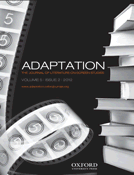
Adaptation-The Journal of Literature on Screen Studies
Transforming Texts into Visual Narratives.Adaptation: The Journal of Literature on Screen Studies, published by Oxford University Press, stands at the forefront of interdisciplinary scholarship, blending the realms of literature, visual arts, and performing arts. This esteemed journal addresses the evolving relationship between literature and its adaptation into various screen formats, providing a vital platform for researchers, professionals, and students interested in the adaptation process across different media. With a commendable 2023 impact factor reflected by its recognition in the Q1 quartile categories for Literature and Literary Theory as well as Visual Arts and Performing Arts, it ranks in the top tiers of its field, showcasing its influence and reach. The journal is dedicated to exploring theoretical and practical approaches to adaptation, ensuring that voices from diverse perspectives are heard. Although it operates under traditional access models, the insights offered in its publications are invaluable for those looking to deepen their understanding of how literature translates into screen narratives. With coverage spanning from 2010 to 2024, Adaptation continues to be a pivotal reference point for innovative scholarship and critical discourse.
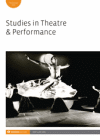
Studies in Theatre and Performance
Challenging Norms, Inspiring Innovation in TheatreStudies in Theatre and Performance is a distinguished academic journal published by Routledge Journals, Taylor & Francis Ltd, dedicated to advancing scholarship in the dynamic fields of visual arts and performing arts. Since its inception in 2000, the journal has become an essential resource for researchers and professionals, exemplified by its ranking within the Q2 category of visual and performing arts, and its commendable position at the 76th percentile among its peers. With an ISSN of 1468-2761 and an E-ISSN of 2040-0616, the journal serves as a platform for insightful research, critique, and innovation across a variety of topics in theatre and performance studies. Although it operates under a traditional access model, its rigorous peer-review process ensures that every publication contributes significantly to the broader understanding of theatrical practices and performance methodologies. As we move towards 2024, Studies in Theatre and Performance continues to be a vital reference point for scholars and practitioners alike in exploring new dimensions of performance theory and practice in an ever-evolving cultural landscape.
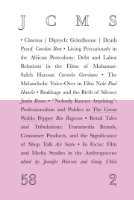
JCMS-Journal of Cinema and Media Studies
Engaging with the Dynamics of Contemporary MediaJCMS-Journal of Cinema and Media Studies, published by University of Texas Press, stands as a vital platform for scholars and practitioners in the realms of cinema, media, and visual arts. With an ISSN of 2578-4900 and an E-ISSN of 2578-4919, the journal has been a part of the academic landscape since its inception in 2018 and will continue to contribute valuable research until 2024. Notably ranked in the top tiers of Scopus, securing Q1 status in Visual Arts and Performing Arts and Q3 in Communication, JCMS features articles that critically engage with both traditional and contemporary issues in media studies. Located in the United States, the journal is committed to providing open access to a wide array of interdisciplinary research, fostering dialogue among researchers, students, and media professionals. By serving as a nexus for innovative scholarship and creative discourse, JCMS enriches our understanding of cinematic and media practices and their impact on society today.
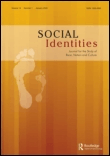
Social Identities
Navigating the Nuances of Social Structures and IdentitiesSocial Identities is a distinguished academic journal published by Routledge Journals, Taylor & Francis Ltd, dedicated to advancing the understanding of social identities from a multidisciplinary perspective. With an ISSN of 1350-4630 and an E-ISSN of 1363-0296, this journal stands out in the sociology and political science disciplines, as evidenced by its impressive Q2 ranking and a Scopus percentile of 64th. Spanning from 1995 to 2024, it continually fosters scholarly discourse on the complexities of identity formation, representation, and the interplay between various social dynamics. Although the journal currently does not offer Open Access options, it remains a valuable resource for researchers and professionals seeking in-depth analysis and critical insights. Based in the United Kingdom, Social Identities is a vital platform for both emerging scholars and established experts dedicated to exploring the nuances of how identities shape social structures and experiences.

Asian Cinema
Advancing Scholarly Dialogue in Asian Film StudiesAsian Cinema is a distinguished academic journal dedicated to exploring the vibrant landscape of cinema across Asia, published by INTELLECT LTD, a recognized name in scholarly publishing. With its ISSN 1059-440X and E-ISSN 2049-6710, this journal has carved a niche within the realms of Communication and Visual Arts and Performing Arts, holding a 2023 Q4 ranking in Communication and a more favorable Q2 ranking in Visual Arts and Performing Arts. Operating out of the UK, specifically at THE MILL, PARNALL RD, BRISTOL BS16 3JG, ENGLAND, Asian Cinema provides a platform for interdisciplinary dialogues, critiques, and analyses that contribute significantly to the understanding of cinema as a cultural artifact. Acknowledged for its robust contribution to scholarly research, the journal commands a Scopus rank of 151 out of 667 in Visual Arts and Performing Arts, placing it in the 77th percentile, while achieving a 366 out of 511 rank in Communication, reflecting its ongoing relevance in the field. Although it operates under a traditional access model, Asian Cinema remains vital for researchers, professionals, and students alike, enriching academic discourse and providing valuable insights into the rapidly evolving cinematic practices across Asia.

Critical Studies in Television
Advancing Critical Perspectives in Television StudiesCritical Studies in Television is a leading academic journal published by SAGE Publications Ltd, dedicated to exploring the intricate dimensions of television within the fields of Communication and Cultural Studies. Since its inception, this journal has become an essential resource for researchers, professionals, and students alike, particularly as it navigates the evolving landscape of television studies from 2014 to 2024. With an impressive impact factor, the journal achieved notable rankings in 2023: it is positioned in the Q2 quartile for Communications and the Q1 quartile for Cultural Studies. Recognized by Scopus with a rank of #160 in Cultural Studies and #193 in Communication, it reflects its growing influence and relevance in these academic arenas. While currently not available through an Open Access model, readers are encouraged to engage with its diverse and critical contributions that foster a deep understanding of television’s role in contemporary culture.

French Screen Studies
Charting New Frontiers in Film and Media StudiesFrench Screen Studies is a distinguished journal published by Routledge Journals, Taylor & Francis Ltd, focusing on the dynamic interactions between film, media, and cultural studies within the context of French cinema. Since its inception in 2020, the journal has contributed significantly to the academic landscape, providing a platform for innovative research and critical discussion on visual arts and performance as reflected in its prestigious Q1 ranking in Visual Arts and Performing Arts for 2023. Despite being a burgeoning journal, it holds an impressive position within Scopus rankings, particularly in the Arts and Humanities sphere. Researchers and scholars will find the journal a vital resource, as it endeavors to explore the intersections of screen studies with broader social and cultural implications. Although currently not open access, French Screen Studies continues to foster an inclusive dialogue among academics, paving the way for future exploration of France’s influential cinematic heritage.
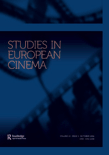
Studies in European Cinema
Celebrating the Artistry of European FilmmakingStudies in European Cinema is an esteemed journal published by Routledge Journals, Taylor & Francis Ltd, focusing on the multifaceted realms of European cinema and its contextual relevance. With an ISSN of 1741-1548 and an E-ISSN of 2040-0594, this journal provides a dynamic platform for researchers and practitioners in the fields of Communication, Visual Arts, and Performing Arts. As reflected by its recent Scopus rankings, it holds a respectable position in the Arts and Humanities with an 84th percentile rank, indicating its significance and impact in the scholarly community. While not entirely open access, Studies in European Cinema seeks to foster critical discourse and analysis from 2004 to 2024, covering a broad spectrum of topics related to film studies, cultural representations, and the evolving narratives within European cinematic practices. Engaging with diverse theoretical frameworks, the journal aims to contribute to the vibrant dialogue surrounding European cinema, making it an essential resource for academics, filmmakers, and students alike who are passionate about exploring cinematic expression in a European context.